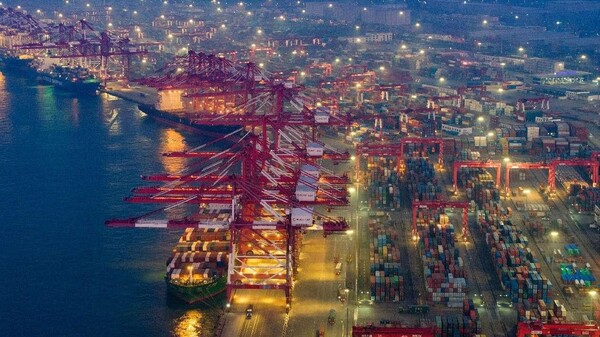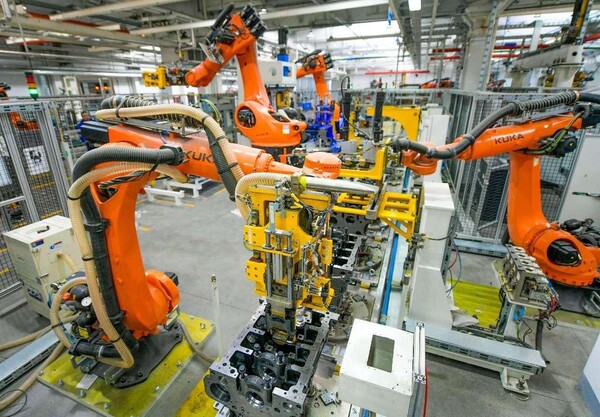By Wu Lejun, Wu Qiuyu, Yu Yichun, People's Daily
The International Monetary Fund (IMF) recently raised its growth forecast for the Chinese economy and other emerging economies in Asia in 2024. At the same time, the IMF has increased its global economic growth forecast for this year by 0.2 percentage points to 3.1 percent due to the resilience of major economies like China.
The IMF pointed out that the lift of China's economic growth forecast reflects the continuation of the strong growth momentum in the Chinese economy last year, which exceeded expectations, as well as the stimulating effect of relevant policies implemented by the Chinese government.
In 2023, China's GDP exceeded 126 trillion yuan ($17.51 trillion), growing 5.2 percent from a year ago. China still remains the largest engine of global growth. In January 2024, the country's economic vitality showed signs of recovery, sending positive signals for the year's economic performance.

Not only the IMF, other international financial institutions such as Goldman Sachs and UBS Group recently have also released reports indicating that China's consumption and service industries will continue its post-pandemic recovery trend in 2024.
Recently, leaders of international institutions and multinational companies have made frequent visits to China, including a Japanese economic delegation, a delegation led by the World Bank executive director, Danone Group from France, Amway Group from the United States and BMW from Germany. They showed confidence in the Chinese market and hoped to deepen practical cooperation with China.
At Xiaomo International Logistics Port in Shenzhen, south China's Guangdong province, a roll-on/roll-off ship owned by Chinese new energy vehicle maker BYD set sail, carrying over 5,000 Chinese made NEVs and heading towards the Flushing Port in the Netherlands and the Bremerhaven Port in Germany.
In 2023, China became the world's largest exporter of automobiles for the first time. Statistics show that one in every three cars exported by China is an electric passenger vehicle. Last year, China's exports of NEVs, lithium batteries, and photovoltaic modules surpassed 1 trillion yuan, leading the world in market share.

At the Alashankou port in northwest China's Xinjiang Uygur autonomous region, China-Europe freight trains departed one after another, carrying daily necessities, automobiles and spare parts, machinery equipment, and other goods manufactured in various parts of China to Europe.
In 2023, China-Europe freight trains made 17,000 trips throughout the year, transporting 1.9 million twenty-foot equivalent units, marking a 6 percent and 18 percent increase, respectively, compared to the previous year.
This "golden channel" of international land transportation has connected 217 cities in 25 countries between China and Europe, injecting continuous momentum into bilateral trade and economic exchanges.
China is the only country with industries across all categories in the United Nations (UN) industrial classification. "Chinese companies have significant advantages in terms of innovation capability, iteration, and manufacturing efficiency, and behind this is China's well-developed industrial chain and its massive market," said Tang Zhimin, director of China ASEAN Studies at the Bangkok-based Panyapiwat Institute of Management.
China is a major trading partner for over 140 countries and regions. Borge Brende, president of the World Economic Forum, noted that China is shifting from investment- and infrastructure-driven growth to innovation-led growth, and it holds a crucial position in global economy and trade.
Sonali Jain-Chandra, chief of an IMF team conducting discussions on the 2023 Article IV Consultation in China, noted that the policies implemented by the Chinese government will have a positive impact on the economy.
She also said that research conducted by the IMF indicated that when China's growth rate rises by 1 percentage point, growth in other countries increases by around 0.3 percentage points.
She believes that China's economic growth in 2024 will still surpass the global average, making China a major contributor to global economic growth in that year.

In the new year, various regions in China have outlined their "roadmaps" to build a world-class business environment that is market-oriented, law-based, and internationalized.
Shanghai has proposed further advancing high-level reform and opening up, enhancing development momentum and competitiveness, and vigorously promoting pioneering reforms and leading opening-up initiatives in all aspects.
Guizhou province will implement actions to improve the quality and efficiency of foreign trade. Chongqing municipality will advance high-level construction of the New International Land-Sea Trade Corridor to build itself into a highland of opening up.
China is focusing on accelerating the development of new productive forces and embracing innovation and transformation as important new trends in its economy.
The country is actively promoting digitalization and green, low-carbon transformation in industries. Xiao Song, global executive vice-president of Siemens, said that foreign companies deeply feel China is becoming an "innovation field" for cutting-edge technologies.
"The fundamentals sustaining China's economic recovery and long-term growth remain unchanged. As an open country, China will continue to bring more cooperation opportunities to the world. The future of China's economy is bright, and we are full of confidence in it," said Liu Sushe, deputy head of the National Development and Reform Commission.


